#Sir Walter Pole
Text

"No young lady ever had such advantages before: for she died upon the Tuesday, was raised to life in the early hours of Wednesday morning, and was married upon the Thursday..."
"When her husband and friends anxiously inquired what the matter was, she replied that she was sick of dancing and wished to dance no more. As for music, it was the most detestable thing in the world - she wondered that she had never realized it before."
Double quotation, though drawing is mainly tied to segment three in the jsamn 20 readalong!
#doesn't depict a specific scene‚ but anyways#jsamn#js&mn#jonathan strange and mr norrell#my art#emma pole#the gentleman with the thistledown hair#sir walter pole
2 notes
·
View notes
Text


French infantry baffled by redcoat-wearing fox, think British troops have too much time on their hands and have started dressing up the local wildlife, more at 7
#Jonathan Strange and Mr Norrell#Major Colquhoun Grant#Jonathan Strange#Sir Walter Pole#JSAMN#reading log
4 notes
·
View notes
Quote
And being a man - and a clever one - and forty-two years old, he naturally had a great deal of information and a great many opinions on almost every subject you care to mention, which he was eager to communicate to a lovely woman of nineteen - all of which, he thought, she could not fail but to find quite enthralling.
Susanna Clarke, Jonathan Strange and Mr Norrell
#quote#quotation#Susanna Clarke#Jonathan Strange and Mr Norrell#Sir Walter Pole#Emma Pole#man#clever#information#opinions#enthralling
46 notes
·
View notes
Text
Strange seemed to have reverted to his old bachelor habits. Tables and chairs were fast disappearing under piles of papers. Half-finished chapters of his book were to be found in every part of the house and in the drawing-room he had even taken to making notes upon the wallpaper.
Sir Walter started to remove a pile of books from a chair.
“No, no!” cried Strange. “Do not move those! They are in a very particular order.”
“But where shall I sit?” asked Sir Walter in some perplexity.
Strange made a small sound of exasperation as if this were a most unreasonable request. Nevertheless he moved the books and only once became distracted in the process and fell to reading one of them. As soon as he had read through the passage twice and made a note of it upon the wallpaper he was able to attend to his guests again.
— Jonathan Strange & Mr Norrell (Susanna Clarke)
#book quotes#fantasy fiction#historical fiction#alternate history#susanna clarke#jonathan strange & mr norrell#jonathan strange#sir walter pole#books#reading#academia#study#research#bibliophile#distraction
19 notes
·
View notes
Text
Read along chapter 3
I’m trying something new and scribbling notes as I go.
1: I love Vinculus! The prophecy is so melodramatically mystical and then we find out he pilfered three meat pies and two cream cheeses 😆
2: Jonathan Strange’s father is the absolute Worst. In the last chapters I mentioned how much I liked that all the characters have shades for grey. This guy does not have one redeeming feature. He’s just an ass. But it does give a lot of background to why Jonathan is as he is.
3: Jonathan Strange prefers the company of clever women. Good for him!
4: The description of Lost Hope (and the way the servants feel in Walter Pole’s house) is so disturbingly vivid. I love that magic is so incredibly disorienting. Even the description of London on a winter evening - this is a book you live while you read it!
5: The doctor telling Walter Pole that Emma is obviously just upset about something: “Ah said Mr Baillie in a kindly fashion. It might well appear to Sir Walter that there had been no quarrel. It was often the case that gentlemen did not observe the signs.” It says so much about the times.
6: Everyone is so… trapped in this book. Stephen 😢
7: I am delighted that the next chapter is the unlikely milliner :D
15 notes
·
View notes
Text
Like the way Emma Wintertowne was married to Sir Walter Pole for the sake of his career and then she was traded to the gentleman with the thistle-down hair for Norell's career. How her mother did nothing about her illness the same way her husband did nothing about her enchantment. How her entire life she's been suffocated by people who say they love her. I am going to scream.
Of course she doesn't believe that Jonathan is going to save her and Arabella. The gentleman with the thistle-down hair is as much her husband as Walter Pole is. Half her life belongs to one man and the other half to the other.
No wonder she's furious
144 notes
·
View notes
Text
Let your raven flags fly, folks! Tis the season of bisexual icon John Uskglass.
Wander a frozen moor in a black gown!
Bury your heart in a dark wood beneath the snow, yet still feel its ache!
Spend your nights dancing in the ruins of a fairy court, and your days ignoring Sir Walter Pole!
Imagine the bleakest of November landscapes, but make it camp!
#jonathan strange and mr norrell#john uskglass#susanna clarke#jonathan strange & mr norrell#js&mn#starecrossed lovers#the raven king
71 notes
·
View notes
Text
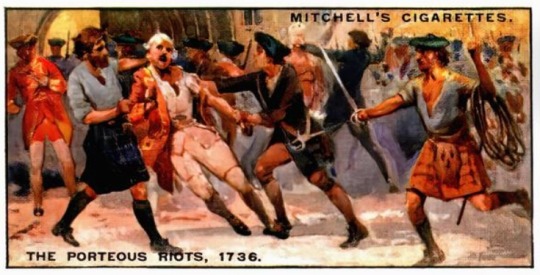
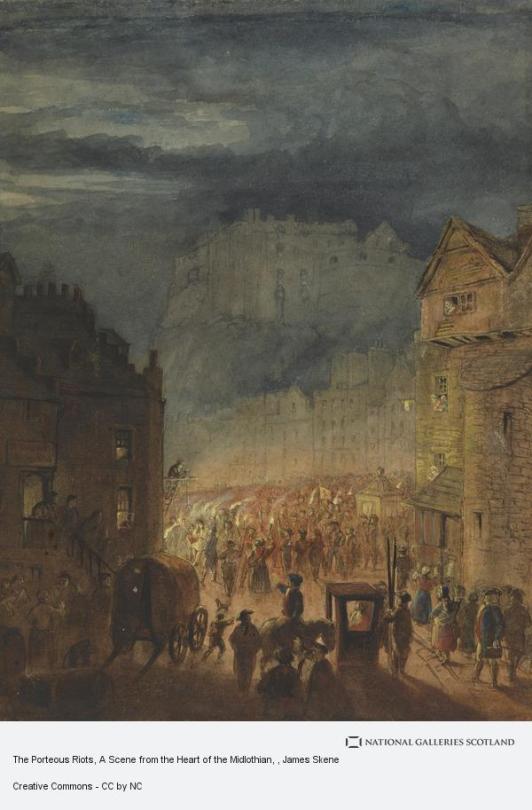
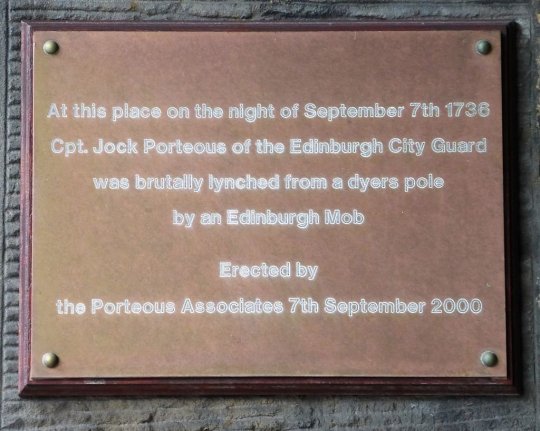
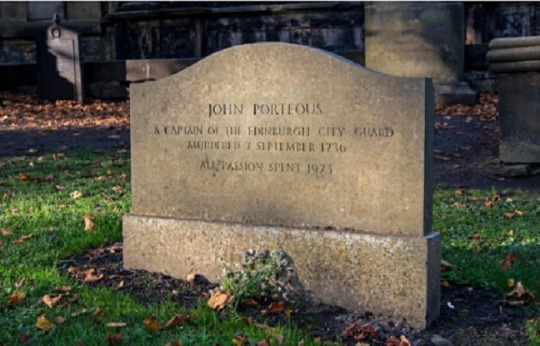
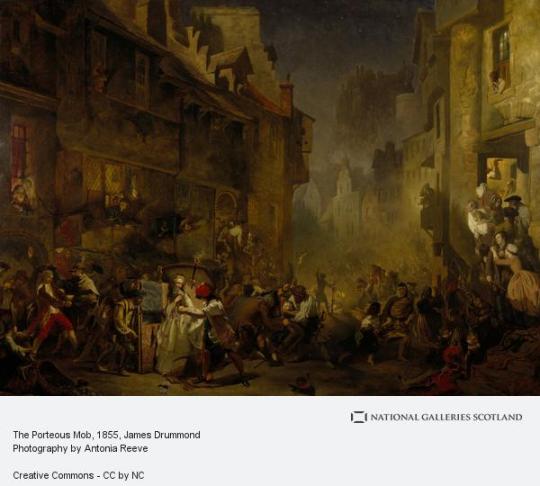
April 14th 1736 saw the Porteous Riots in Edinburgh take place.
The riots that erupted were over the execution of a smuggler called Andrew Wilson. Andrew was one of three who were charged with smuggling and attempting to rob Collector of Excise, James Stark at the Pittenween Inn, Fife
One of the men, William Hall, turned Kings evidence and was exiled from Scotland, which left Wilson and his friend George Robertson, facing the hangman’s noose.
The pair had been locked up in the Tolbooth on the High Street and an attempt at escape had been thwarted after the rather portly Wilson got stuck in a window after managed to saw through some bars.
A few days before sentence was to be carried out, the men were taken to the Kirk to make their peace with the lord and repent for their sins, it was here Wilson caused a distraction and Robertson made off, according to tradition he made it to Holland and ran a Tavern the rest of his days.
There was a feeling of sympathy for Wilson, not just because he was the only one left to face the music, but the populace of Edinburgh, and Scotland as a whole were still smarting at the higher taxes imposed through excise after the act of union, on the day of his hanging a large crowd had gathered and they were a bit unruly to say the least but the execution took place without incident, but the peace didn’t last long. Just as Wilson’s body was being cut down from the gallows, a section of the crowd began pelting the executioner with stones. Rumours had been rife that Wilson had been tortured while incarcerated and what had been a relatively calm sea of spectators quickly transformed into an angry mob.
The city guard fired into the crowd, killing a few and wounding a considerable number of persons. John Porteous, captain of the city guard, who was accused of both shooting and giving the order to fire, was brought to trial in July and sentenced to death.
Events in Scotland alarmed the government in London, and Sir Robert Walpole attempted to influence events by asking his representative in Edinburgh to become involved ordering The Captain be pardoned. He had miscalculated, underestimated the depth of feeling in Scotland.
On the eve of Porteous’ proposed execution, a 4,000 strong mob took to the streets of Edinburgh. A total lockdown was ordered by the City Guard and all gates, including the Netherbow Port were closed – shutting out many troops stationed outside of the town. The enraged mob made their way to the Tolbooth Prison where Porteous was being held and set the jail door alight. Porteous attempted to flee but was eventually grabbed by force and dragged up the Lawnmarket, then down along the West Bow towards the Grassmarket where Andrew Wilson had met his end. Porteous was strung up on a dyer’s pole and brutally lynched until he ceased to move. The government would later declare a reward of £200 for any information of those responsible for Captain Porteous’ murder, but none of those guilty would ever be found. Sir Walter Scott’s famous novel The Heart of Midlothian written in 1818 would later recall the events in great detail.
On the Grassmarket just past Armstrong’s Vintage shop you will see the plaque commemorating Porteous, and to your right heading east you can enter Greyfriars Kirkyard and visit his grave, as seen in pics two and three.
21 notes
·
View notes
Text
thinking about how we're told that stephen black was the only one with the keys to sir walter's pistols & how baffled everyone is at how lady pole could have gotten them to kill norrell with. thinking about it very much. also god I wish we got to see the whole set up to this from their end & more of their relationship
#<- like I don't think he'd ever personally want to take revenge on norrell himself but. i Do think would have helped her to be able to#do it herself if she really asked & was set on it#<- i can't remember if there's anything that elaborates on this beyond the rlly ambiguous bit we have norrell say to childermass?#but like. I think so. i think that's what happened#<- still chewing it over#thoughts#jonathan strange and mr norrell
35 notes
·
View notes
Text
I'm sorry i transed all of their genders
14 notes
·
View notes
Text
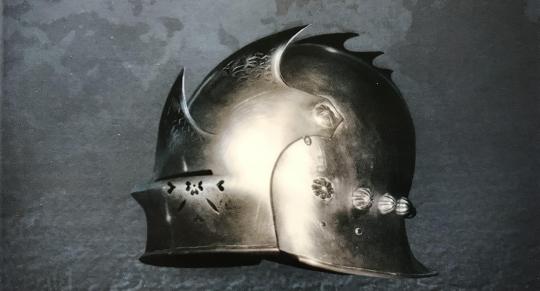
ASOS; Steel and Snow: 01 JAIME I (pages 18-32)
Brienne and Jaime, accompanied by Ser Cleos, begin the long journey to King's Landing under Catelyn's orders.
-
An east wind blew through his tangled hair, as soft and fragrant as Cersei's fingers.
I feel like this tells us so much about Jaime, but also nothing we didn't already know. The boy is besotted.
...Jaime... stop calling Brienne 'the wench'... and also stop talking like that kind of asshole just to try and regain some of your perceived power in the situation, you're not in charge, you're just being an asshat.
"Lady Brienne?" She looked so uncomfortable that Jaime sensed a weakness. "Or would Ser Brienne be more to your taste?" He laughed.
I mean that depends on whether you consider Ser to be a man's title or a knight's title. irl the female equivalent of Sir/Ser is Dame.
Dame Brienne of Tarth.
But also if he doesn't stop heckling, I'm going to bust out the steel chair and bop him.
"Let Robert do as he pleases. I'll go to war with him if I must. The War for Cersei's Cunt, the singers will call it."
'Cunt' = 🥛
Oop, Jaime confirms he did not try to have Bran killed, and doubts Cersei was the culprit either, the suspects narrow!
We know who did it. But Jaime doesn't. I like that GRRM doesn't magical-hive-mind information, with as many characters as he has, it can be so hard to keep track of who knows what, and what the audience should know at any given point in time... actually, since I know from watching the show, I remember Tyrion had some very strong suspicions on who the culprit was, but I can't remember if he's wheedled a confession yet. That is the down side to only reading a chapter a day, by the time a play pans out, I've forgotten it was in the works, or the inverse, I remember that someone set a trap and forget it was already sprung XD
... okay, I'll admit it, Jaime's idea to give himself the Walter White aesthetic was a good one. Easy disguise with no magically appearing prosthetics, flips the traits he's known for and lets them stay lowkey on the journey.
A few one-room shacks came and went, perched on tall poles that made them look like cranes. Of the folk who lived there they saw no sign. Birds flew over head, or cried out from the trees along the shore, and Jaime glimpsed silvery fish knifing through the water. Tully trout, that's a bad omen, he thought, until he saw worse-one of the floating logs they passed turned out to be a dead man, bloodless and swollen. His cloak was tangled in the root of a fallen tree, its color unmistakably Lannister crimson. He wondered if the corpse had been someone he knew.
oooh, packed a bit into that paragraph. some lowkey world-building, a reminder that Shit Has Gone Down in the area, and a brief flash of humanising for Jaime. The wondering if he's known the dead feels like the first bit of sympathetic thought I've seen from him so far that's not self-or-cersei-centered. Oh, it's not exactly empathetic, like he doesn't sound like he's mourning this poor fallen John Doe, but it matters that he cared enough to wonder, implies connection to the Lannister men besides all being team Lannister. Jaime doesn't just know them, he knows some of them.
They sailed past villages but no villagers. An empty net, slashed and torn and hanging from some trees, was the only sign of fisherfolk. A young girl watering her horse rode off as soon as she glimpsed their sail. Later they passed a dozen peasants digging in a field beneath the shell of a burnt towerhouse. The men gazed at them with dull eyes, and went back to their labors once they decided the skiff was no threat.
You know what would have been hilariously ironic, but in the most frustrating way possible?
If that young girl with the horse had been Arya. If they had been so close to recovering Arya in that moment, but she noped out, there-by saving herself from the Red Wedding. (Assuming her recovery at this point doesn't change things like getting Rob caught up on the fact Roose Bolton is absolute (competent) garbage.)
Below, Jaime made out the smouldering remains of a large building, and a live oak full of dead women.
Hanging tree.
*suddenly, a volcano erupted directly under Roose Bolton and his forces, with more wrath and speed than expected, as if an angry god was responsible, the molten stone spewed forth and swarmed over those responsible for the atrocities, burning them to a crisp.*
Actually, fun fact, because lava and magma are liquid stone, the density means that human bodies would float, or, well, bob. The Golem scene from the end of the Lord of the Rings trilogy should be reversed, the Ring sinking and Golem bobbing back to the surface and slowly burning until his buoyancy is low enough for him to sink through the superheated sludge. I mean he'd likely be dead pretty quick from breathing superheated air before the meat really got cooking, so he would suffer for long, and that's assuming he survives the fall. People die from that height falling onto unbroken water and stone. guy totally should have died.
... sorry. too morbid?
Brienne moved the tiller and the skiff sheared left, sail rippling. Jaime watched her eyes. Pretty eyes, he thought, and calm. He knew how to read a man's eyes. He knew what fear looked like. She is determined, not desperate.
yay Brienne! Go! Go! Go! (and good job finally making some good observations Jaime... and he's already back to 'wench.')
... oh, but he's covering for Brienne's lack of cover by pulling aggro! Nice, TeamWork!
I mean, let's not start the bromancing just yet, at this point he's doing it because Brienne and her plan are his best chance at getting back to Cersei.
!!!! Brienne casts Rocks Fall, Everyone Dies! (well, not the TPK version, but she drop a rock "the size of a cow"! I love her so much!
Ser Cleos turned the skiff towards her. Thankfully, Jaime still had his oar. One good swing when she comes paddling up and I'll be free of her.
Instead, he found himself stretching the oar out over the water. Brienne grabbed hold, and Jaime pulled her in.
See, it's moments like this that give me such confliction with Jaime, it makes me want to say "because at heart he is a good man, who, though he struggles with it, wants to do the right thing, to be the Good guy."
And then I remember he threw an eight year old child out a window to his presumed death with zero hesitation, and I think "well clearly not, actually."
Ahhh, our first Jaime chapter, it's a little jarring to see inside his head, how he cares so little for people in general, like, his whole world is Cersei (and maybe Tyrion and their dad?) and everyone else doesn't seem to register much, but at the same time, there is some level of care, Jaime does show a goodness despite his attempted child-murder and treasoncest. Whether his care is long buried for tragic backstory reasons, or whether it's something that's never really had a chance or reason to grow... I guess we'll see.
More importantly: Jaime&Brienne BROadtrip: Commence!
We'll see how it goes in comparison to the show.
#a storm of swords#steel and snow#a song of ice and fire#jaime lannister#a chapter a day reading#asos#asoiaf
12 notes
·
View notes
Quote
Being a politician, he was never dissuaded from giving any body his opinion by the mere fact that they were not inclined to hear it.
Susanna Clarke, Jonathan Strange and Mr Norrell
#quote#quotation#Susanna Clarke#Jonathan Strange and Mr Norrell#politician#opinion#inclination#Sir Walter Pole
20 notes
·
View notes
Text
Thrilled to get drunk and do a rewatch of JSMN a few years and more film club meetings later. I’m noticing a lot more about the directing like how in ep1 they stage Mr Drawlight with Mr Lascelles behind him just to get their eyelines level, and to I play bits about who is leading the conversation. The way the Norrell is sitting back in his chair when discussing raising the dead, but when he leans forward and commits it puts him center frame.
The way in ep2 when Stephen first meets The Gentleman with the Thistledown Hair there’s a really heavy color grading and the camera is constantly moving a bit to make the whole scene feel unreal and uneasy.
In ep3, the tension build up to Jeremy dying by cannon, how it keeps cutting between the cannon/cannonball and Jeremy's face to really emphasize him right before he dies. They even put in a slow-mo shot of the cannonball.
The very opening of ep7 and a few other times where they do a tight focus behind a character's back following them as they walk and everyone else is out of focus. Heck of an establishing shot.
Actually why does Norrell wear a wig but Strange and Sir Walter Pole does not? Is it a generational stylings gap? Does it tie into Norrell's deep insecurities and need to be taken seriously and respectable?
#jsmn#cw alcohol#I love being able to take a step back#and go wow the camera work is good#jonathan strange and mr norrell
7 notes
·
View notes
Note
📓 <3
Thank you for the ask - you get one of the AUs I’ve had in my head for a very long time because it’s probably the weirdest thing I’ve come up with. Let me try to convince you!
Every autumn as the days get shorter, Strictly Come Dancing appears on TV and I get nostalgic for the Jonathan Strange and Mr Norrel Strictly Come Dancing AU that I am never going to write for a million reasons, the first of which is that I don’t even know why I like it so much. It sounds ridiculous, doesn’t it?
But what if Strictly isn’t just Strictly? What if it’s being run by an enigmatic gentleman with a penchant for velvet jackets, making bargains and hair like… thistledown? What if the ballroom where you sign up to dance all day and all night is this AU’s Lost Hope? Where you can never leave because of your contract with the Gentleman? And who knows what bargains he struck to get you to agree….
The gentleman wants his favourite pro dancer Stephen to win at any cost and he means ANY.
Sir Walter Pole wants a good PR hit before the next election so signs up his young and beautiful wife to aid his popularity (He couldn’t take part himself of course, because he might not do well and can’t risk looking foolish. He can, however, show up to support his wife). So the Gentleman makes a bargain, pairs Emma with Stephen and he’ll do anything to get them to the final so they can dance for him forever. And if there was a tragic accident to Emma’s finger during early rehearsals well that’s just a chance for sympathetic reporting in the popular press.
Thistles can’t always plan for everything though - Arabella Strange is an unexpected star with a husband who does the best supportive videos and is arranging a social media campaign by accident because he just loves his wife so much and wants to tell everyone how proud of her he is.
John Childermass was supposed to be a joke act who left before Halloween but despite looking out of place in every costume the man can dance (sort of, when Hannah takes him in hand) and his blunt Yorkshire take on things has a definite fan following. His salsa goes viral. His rumba causes riots.
Flora Greysteel is popular with the younger generation and doing too well for Thistles to be comfortable. She might once have run off to have an affair with a poet but when ‘someone’ leaks it to the press she turns out to have a formidable protector in her father and her new friends the Stranges.
John Segundus and Mr Honeyfoot were a pair of nobodies that should both have gone out in the early weeks but Segundus just keeps coming back. Nobody can doubt his persistence or his commitment to the training. Dancing is my life, he says, and he can’t think what he’d do if it was taken from him. That earnest comment earned him a solid block of devoted viewers. It also gained him devotion of another kind. Under the cover of the general Strictly mayhem, Childermass has been making tentative overtures to ‘John S’ as he battles with recurrent dizzy spells - is it just the Viennese waltz or is it the magic of Strictly? Childermass is always there to look after him if he needs it.
While the stakes were low to start with as the no hopers were voted off, as the final looms The Gentleman has to make a choice about who he really wants to win now and what he’ll do to get it. If that means releasing some photos to the press suggesting that the Stranges are really rather fond of Bell’s dance partner Colley Grant, well he has the footage waiting and if some people need to encounter some strategic accidents so be it. By the end of November the Gentleman is using any kind of tactic to make sure the public vote the right way - social media influence and press scandals and dubious judge’s marking (one could almost swear that Craig has been bewitched). So the series runs with even more than the usual strictly scandals - Maria Bullworth’s husband cites her dance partner Art Wellesley in divorce proceedings but was it really him or was it fellow contestant Henry Lascelles? Art has a reputation for flings but backstage rumour says he’s far more interested in Flora’s partner Will and there are uglier rumours about Henry and who really caused Chris Drawlight to be injured by falling props in movie week (conveniently removing him from the show before any nasty rumours about his business dealings could break).
But it’s Strictly and the voting public is as fickle as ever. As scandals break, the tabloids go wild, and the stars get closer to the glitter ball, the stresses and stains begin to take their toll and the press start to ask ‘how is lady Pole?’
“Unless you’ve done it before”, she says in an interview, “nobody can really understand what it’s like to be part of the magic of ballroom and when you’re on Strictly it feels like you’ve been dancing forever. And ever. And ever.”
4 notes
·
View notes
Text
Putin will soon turn his war machine on Britain
THE TELEGRAPH
Comment
Putin will soon turn his war machine on Britain
The Kremlin holds us responsible for its failures and will, at some point, attempt to exact its revenge
Ben Wallace
26 August 2024 • 6:00pm
In October 2022, in the dead of night, specialist troops and officials from Moscow slipped into St Catherine’s Cathedral in Kherson and exhumed the bones of famed 18th-century Russian commander Grigory Potemkin. He was a favourite of Empress Catherine the Great and played a critical role in the annexation of Crimea in 1783.
No one knows where they have gone. Perhaps Moscow or Crimea. But the removal was on the orders of Vladimir Putin. If you have ever wondered what drives the Russian president, this single act should give a strong indication. It is history, and Russia’s place in it.
One of the battles I had with the national security establishment in the years up to February 2022 was to persuade them that, despite the intelligence reports and the “wise heads”, Putin was not driven by logic, nor a passion to turn his country into a modern, outward-looking power. He was motivated by revenge, legacy and romance.
He and his Siloviki (past and present securocrats from the KGB and FSB) do not accept that they were the culprits behind the Soviet Union they inflicted on the Russian people. They believe they were the victims of a Western plot. Were it not for the West’s version of history, Russia would be considered to have won the Second World War single-handedly. The Cold War would never have needed to happen because Eastern Europe, including East Germany and Poland, would have wanted to remain pressed to Moscow’s bosom.
The bizarre essay Putin personally wrote in June 2021, entitled The Real Lessons of the 75th Anniversary of World War II, desperately twists facts, ignores events and casts Russia as the saviour of the world. He claims that the Nazi–Soviet pact that led to the invasion and dismembering of Poland was to the UK’s benefit.
In trying to recast Russia’s role in the Second World War, Putin lays blame squarely with Britain and France, and completely distorts the Molotov-Ribbentrop pact. He makes no mention of the massacre of 20,000 Poles at Katyn by the Red Army and secret police in 1940, nor the fact that before the invasion of Poland, Russia trained with the Wehrmacht and sold tanks to them. His essay is worth a read, if only to get a sense of the man.
But don’t expect reality. Expect excuses. Almost a year later, Putin penned another essay: On the Historical Unity of Russia and Ukrainians. It reads like a mix of Mein Kampf and a Walter Scott novel: destiny, ethnic nationalism and romance combined into an essay. It would be too easy to discard, but it is an essay that held all the clues about what was to happen next.
How sad that so many “Russian experts” in the Foreign Office, Quai d’Orsay or Foggy Bottom missed it. The aftermath of the Iraq war left intelligence services too cautious to make judgment calls without their product being washed through matrixes and seniors. Often the middle ranking intelligence officer who has lived and breathed the enemy for 20 years is kept so far in the background that ministers don’t get the instinct or judgment they really need.
Sir John Chilcot produced intelligence analysis that was thorough but it also regularly removed the “human factor”. Too often we assess intelligence through a lens that is a reflection of our own motivations and behaviours rather than those of our adversaries.
But it is also the job of politicians to understand people and their motives. Politicians who cannot read a room make lousy politicians. Leaders who cannot “feel” the currents in international relations shouldn’t be leaders.
When I went to Moscow, barely 10 days before the invasion, to meet the Russian defence minister Sergei Shoigu and General Valery Gerasimov, I didn’t go to read a script, I went to read my adversaries. I went to see how deep the lies went, how big the egos were, what motivated them and the behaviour of the subordinates around them.
As I left I remember commenting to General Gerasimov that I was struck by how his military doctrine had “swapped mass for readiness and mobilisation”. At that moment another General leaned over to add: “and ruthless intimidation”. The mask had slipped. Most telling of all was the comment from General Gerasimov to me in the hallway. “Never again will we be humiliated. We used to be the fourth army in the world, now we are the first or second. It is us and the Americans.”
These men at the top of Russia see themselves as rewriting history, by correcting the humiliation they felt at the end of the Cold War and settling scores for hundreds of years. While Russia is doing a very good job of, yet again, humiliating itself through its own actions, we should realise that in Putin’s version of history it is Britain, not the US, which is at the heart of Russia’s failures.
In Putin’s warped worldview, we were behind the Crimean war and defeat of the Czars, we were behind the rise of Hitler, we were behind the counter-revolution and our espionage was behind the end of the Soviet Union. Britain is in Putin’s crosshairs. One of the most senior members of the Russian Siloviki recently commented: “We know Britain is behind the invasion of Kursk”. We weren’t.
Make no mistake, Putin is coming for us. We must be prepared for the inevitable.
Rt Hon Ben Wallace is a former secretary of state for defence
1 note
·
View note
Text
Nine, “Lady Pole”
-I’m way overthinking the oblique Jane Austen mention and trying to decide if it’s referring to Jane Austen alive or Jane Austen dead, and if Jane Austen was alive when the in-universe narrator started writing the book. The last chapter of the book ends in the spring of 1817; Jane Austen died in the summer of 1817. I’m mostly wondering this because there are parts of the book later on, from what I remember, that place the narrator writing parts of at least a decade after the events of the book take place. But, if the narrator started writing shortly if it directly after the events of the story took place, then the early chapters could have been sketched out in the spring of 1817, when Jane Austen was still around—assuming that the JSMN universe’s Jane Austen died in the same year. If so, that would mean that the in-universe narrator took at least a decade to put everything together, which would mirror the author’s experience of writing the book.
-Branching off of that, one thing the narrator keeps bringing up is the sort of…eh, lesser reputation novels would have had at the time. Many of the early novelists of English literature were women, and novels were looked down on as a lesser form of literature because of it. The author obliquely brings this up a few times in the early chapters (the hypothetical magician’s disgust at realizing a novel is what he’s picked up the read, Lady Wintertowne jumping up to say that her daughter isn’t like other young ladies because she doesn’t waste her time reading novels (though, funnily enough, Walter Pole does and quite likes them), etc. Anyway, I’m bringing this up because it’s really interesting that the part of the metatextual narrative Susanna Clarke has worked into this book is that the in-universe narrator is presenting this work of serious magical scholarship…as a novel. (And yes, I know that it’s because Susanna Clarke was writing for a contemporary audience and there wasn’t really another way to do it, but she still worked the idea into the in-narrative she built around the story.)
-I do kind of love that the general public has no idea what actually happened during the resurrection of Emma Wintertowne, because Lasy Wintertowne, Emma, Walter Pole, and Norrell all refuse to talk to anyone for the whole next day AND Norrell refused to let anyone in the room while the actual resurrection was happening. In fact, we weren’t allowed in the room while the actual resurrection was happening—the book cuts directly from the Gentleman agreeing to help bring her back from the dead to Norrell telling Drawlight and Lascelles that she’s alive and asking for her mom. So, the general public gets a sensationalized version that’s 95% made up from Drawlight and Lascelles.
-Lady Wintertowne is incensed that strangers have opinions on her daughter being brought back from the dead and, for once, I agree with her (on that part, at least). We have a tendency to think of anyone with even a little bit of fame as almost like public utilities belonging to their fans—and tend to forget that they’re just people with lives who probably want to be let alone at least some of the time.
-Okay but the mental image of tiny little Norrell cornering Sir Walter on a staircase at 4 am to talk to him about how he wants to use magic to defeat the French (the napoleonic wars are happening in the background of this whole book. And eventually in the foreground). Just. Yapping the man’s ear off.
-AND Sir Walter finally growing a spine and telling his almost mother in law that they should maybe just MAYBE take Emma’s health into consideration and delay the wedding, and Lady Wintertowne going, “BUT WE ALREADY MADE ALL THE FOOD!” And it all being mute anyway since Emma feels better than she has for years. Is just. Really funny.
-“It was as if Mr. Norrell had not only restored her to life, but to twice or thrice the amount of life she had had before,” she this is why, when a spooky fairy gentleman says he’s going to take half of someone’s life in exchange for raising her from the dead, you really check the fine print to figure out what half a life is.
-There’s something very depressing about the fact that Sir Walter actually isn’t just marrying Emma for the money—he likes her company, and wants to get to know her better, but hasn’t really had a chance to do so because of how sick she’s been—but Emma has the expectation that they won’t get to know each other very well even once they’re married because of how busy he’s going to be doing government work. And she’s apparently fine with that.
-If raising Emma from the dead was Norrell’s ploy to get some traction on people paying attention to magic—to his magic, specifically—it worked. Maybe not in the way Norrell expected, but it worked.
1 note
·
View note